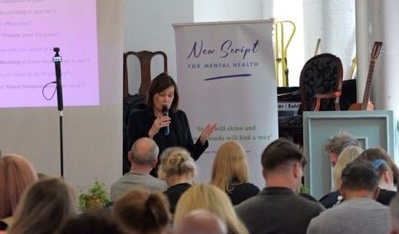The Power Threat Meaning Framework – An Alternative to Psychiatric Diagnosis
Instead of asking what’s wrong with you, ask what’s happened to you? Dr. Lucy Johnstone, Clinical Psychologist, delivers workshop on an innovative approach to mental health
Consultant Clinical Psychologist Dr Lucy Johnstone explored ‘hopeful narratives about emotional distress’ at a Curious Minds workshop in Conway Mill on 15 May, hosted by Participation and the Practice of Rights (PPR) New Script for Mental Health and Glór na Mona as part of local West Belfast Health and Wellbeing Festival Féile na gCloigini Gorma.
You can view the workshop slides here and view a recording of the workshop presentation here
The event considered ‘The Power Threat Meaning Framework’ (PTMF) which was published in 2018 by the British Psychological Society. Lead authors Dr Lucy Johnstone and Professor Mary Boyle offer alternative models of mental health in the framework based on psychiatric diagnosis. It demonstrates the links between social factors such as poverty, discrimination and inequality, along with traumas such as abuse and violence, and the resulting emotional distress. In this way it helps to show that fear, despair, mood swings, and unusual experiences or beliefs are the result of ‘what happened to you’ not ‘what is wrong with you’.
The PTMF can be used to help people create more hopeful narratives about their difficulties, instead of seeing themselves as blameworthy, weak, deficient or ‘mentally ill’. It also shows why those of us who do not have an obvious history of trauma or adversity can still struggle to find a sense of self-worth, meaning and identity. The PTMF has attracted national and international attention, and is now available in six languages.